A lot of descriptions have been given to Gotham’s bat-shaped protector over the years: the Caped Crusader, the Dark Knight, or Batsy if you were to ask a certain Joker. At the end of The Dark Knight, James Gordon even says that Batman is “the hero Gotham City deserves.”
But is that really the case? Writers have been playing on the inherent connection between Batman and his home town Gotham for years. But is Gotham just a place where crazy things happen, or does Batman contribute to that insanity? Is Batman, in fact, good for Gotham?
The History of Gotham
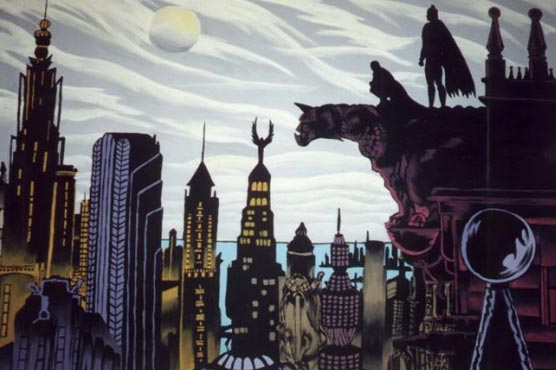
Gotham City is a writer’s paradise in terms of setting. Its dark, urban, with plenty of back alleys, sweeping stylized skyscrapers, and interesting little locations to set every kind of super-tale. It also has a notorious history within the DC Universe for being a dangerous town full of degenerates and criminals. It’s a city full of good people trying to exist in a cesspool of decay, caught in a downward spiral and corruption that has had a crippling hold on the place for generations. The night Thomas and Martha Wayne took their son out to the movies (or the opera) is often presented as a typical event in the horror that is Gotham City.
Then came the Batman.
The Dark Knight: Using Terror As An Agent
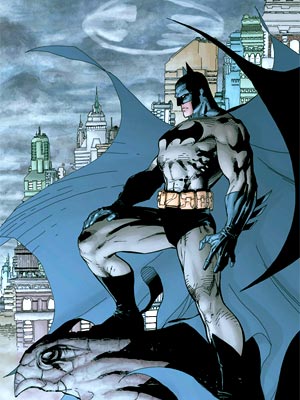 When Bruce Wayne took up the mantle of Batman to combat crime in the comics, he was a game changer. He mixed his nearly unlimited budget with his devotion to physical perfection, using a keen detective’s mind to push forward his unwavering dedication to vengeance. Batman became an image, carefully crafted by Wayne to terrify criminals so they’d be more easily managed.
When Bruce Wayne took up the mantle of Batman to combat crime in the comics, he was a game changer. He mixed his nearly unlimited budget with his devotion to physical perfection, using a keen detective’s mind to push forward his unwavering dedication to vengeance. Batman became an image, carefully crafted by Wayne to terrify criminals so they’d be more easily managed.
Let me be clear about the implications of that for a moment. Batman crafted his image by utilizing terror and fear as a weapon against the criminal element outside of the confines of the law. Batman’s arrival changed the rules under which the city’s criminals and law enforcement historically operated. Where before criminals would maneuver freely around the law and the long-suffering cops who put on the GCPD badge, now doing so would run them straight into Batman. His arrival signaled that it was no longer necessary to operate within the boundaries of the law to police crimes. The only way to stop Batman was to kill him. Something that Batman took great flair in proving impossible, as it only reinforced the terror he inspired in those that he pursued.
This had the effect of making criminals hyper vigilant, paranoid, and even more violent to counter Batman’s overwhelming capabilities. If they wanted to remain in business, they would have to choose more aggressive or insidious tactics to survive a man who did not care about police procedure and investigation. Like bacteria responding to a new antibiotic, the criminals of Gotham got tougher, smarter, and more crafty.
Some of them became literal as well as figurative monsters.
Send In The Clown: Batman’s Villains
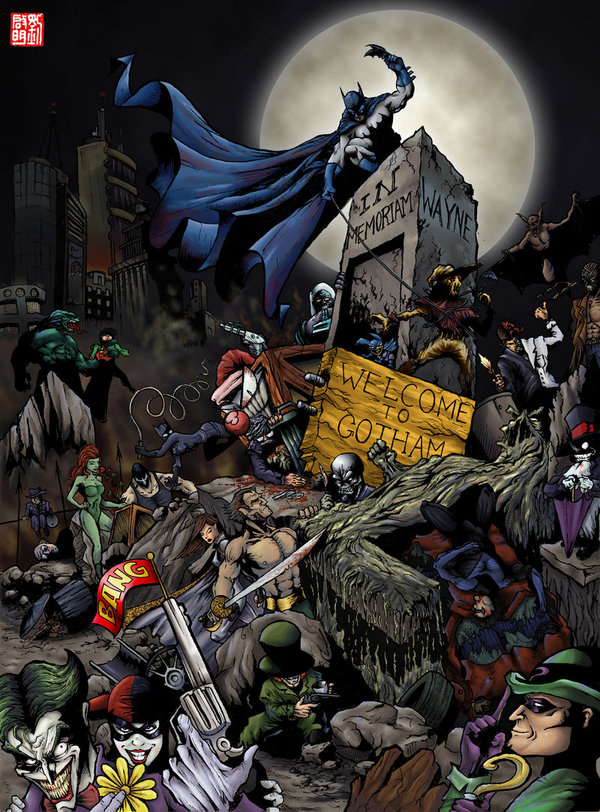 If Batman relied on terror, so too did the super-criminals of Gotham. Out of the shadows popped costumed bad guys the likes of which the city had never seen. They were responding to a man who had already set the standard by stepping out of the boundaries of “normal” so they did the exact same thing. Gone were the days of gangs; in the comics Batman busts their almost laughably pedestrian enterprise on a regular basis. Here came creatures like the Joker.
If Batman relied on terror, so too did the super-criminals of Gotham. Out of the shadows popped costumed bad guys the likes of which the city had never seen. They were responding to a man who had already set the standard by stepping out of the boundaries of “normal” so they did the exact same thing. Gone were the days of gangs; in the comics Batman busts their almost laughably pedestrian enterprise on a regular basis. Here came creatures like the Joker.
The Nolan movies heavily demonstrate Batman’s impact on the criminal element. If the Joker can be said to have any guiding principle, it is to cause carnage in Gotham just to watch Batman react to it.
As Gordon says at the end of Batman Begins, Batman presents a new issue: Escalation. Batman offers them a focal point for their rage at being foiled. Into Arkham Asylum they go to stew in their own fury, only to break out again and try to “kill the Bat” with the city of Gotham stuck in the middle.
And the body count, despite Batman’s best attempts, always goes up.
Dark Knight, White Knight Tactics: The Revolving Door of Gotham Crime
Why do people in Gotham keep dying by the droves at the hands of these costumed madmen, then, if there is a super hero in the city that works almost exclusively to put them away? The problem comes down to deterrent, and that is the crux of this argument.
Batman is not a good enough deterrent to super-criminals. Sure, some of the smaller criminals—the muggers, the pickpockets—might give up their ways or go to jail because of Batman’s actions. But their actions pale against criminals that respond to the escalation Batman embodies.
Say the Joker kills some folks to get Batman’s attention. What next? Well, Batman saves the day all right and Joker gets incarcerated. But does the Joker, the mass murderer and terrorist, end up in some deep, dark hole somewhere? Is he given the death penalty? Or is he placed into a system of justice that the very notion of Batman exists to circumvent? Here is a criminal that has matched Batman’s ability to overpower the capabilities of the police, the legal system, etc., and yet Batman expects that same system to be able to handle said criminal.
This renders the Batman as an almost impotent hero. His villains reoccur so often and so quickly that it proves he is not a capable deterrent for major criminals. He has in fact exacerbated the problem of crime in Gotham by drawing out these psychopaths in the first place and then giving them a target, a new vendetta, and a license to get creative in their mission to “kill the Bat’.” And since he lives by a code that makes him unwilling to kill an enemy, the cycle of destruction continues.
Batman: The Hero Gotham Has
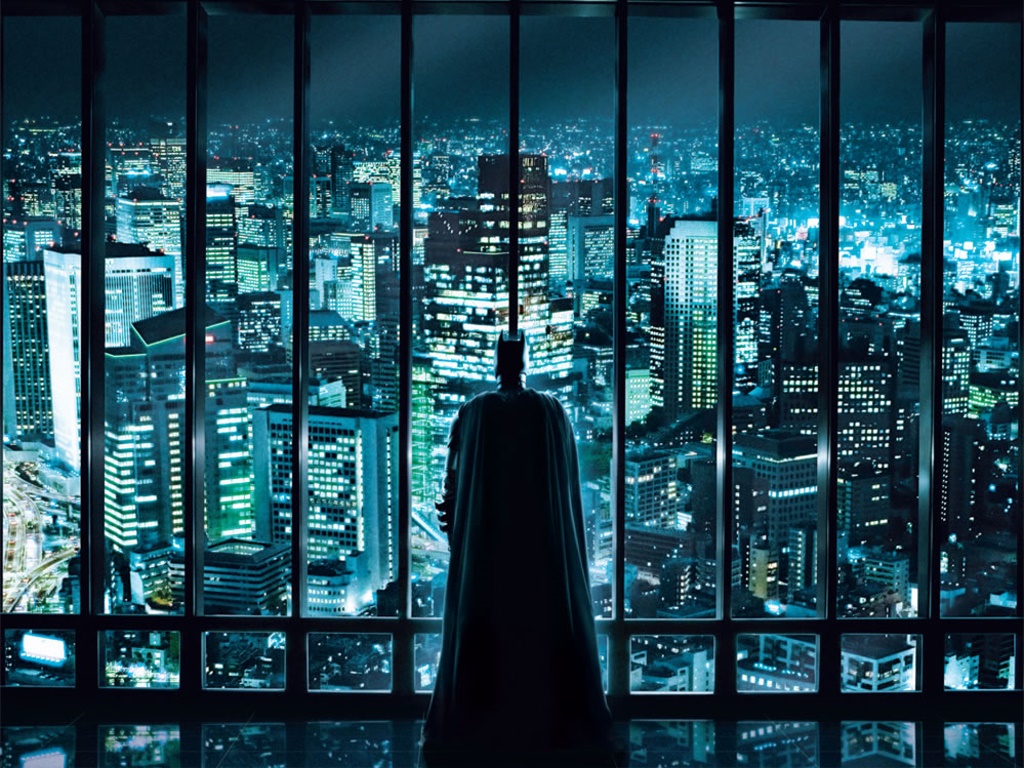
So in the end is Commissioner Gordon right? Does Gotham deserve Batman? A corrupt city out to destroy itself from the inside gets a hero that is a product of that exact system’s malfunction. That hero then evolves the criminal arms race to a battle of crime fighter versus crime titan. Is that what Gotham really deserves?
The question about the almost symbiotic relationship between Batman and Gotham has made for some of the most compelling reading in all of DC Comics. While I could see the shining Metropolis without Superman, I could not see Gotham without the Batman. Vice versa, if Batman had grown up in Coast City or Smallville he’d be a much different creature. Batman is a creature of Gotham as much as he is a super hero, a product of its streets as much as Scarecrow or Riddler or Catwoman. He has been the catalyst for Gotham’s change, for violent upheaval and macabre events since his arrival on the superhero scene. And though he no longer serves as a deterrent, he is as much a part of the cycle of Gotham as its municipal structures. Gotham has running water, Gotham has the Joker killing randomly, Gotham has Batman stopping the carnage. So is the cycle of Batman’s stories.
Would it all end if Batman went away? No. As the comics have shown, the genie is definitely out of the bottle there. Once Batman is away for a little while (such as the times during “No Man’s Land” and the “Knightfall” storylines), the city falls in to even more chaos. Because now, despite whatever was before, Gotham and it’s Dark Knight are inexplicably linked. Batman is the balance against the madness he had a hand in creating. There almost literally cannot really be a Gotham without a Batman.
In the end, perhaps the real statement should be that Gotham is the city Batman deserves. After all, he helped make it what it has become.
Shoshana Kessock is a comics fan, photographer, game developer, LARPer and all around geek girl. She’s the creator of Phoenix Outlaw Productions and ReImaginedReality.com










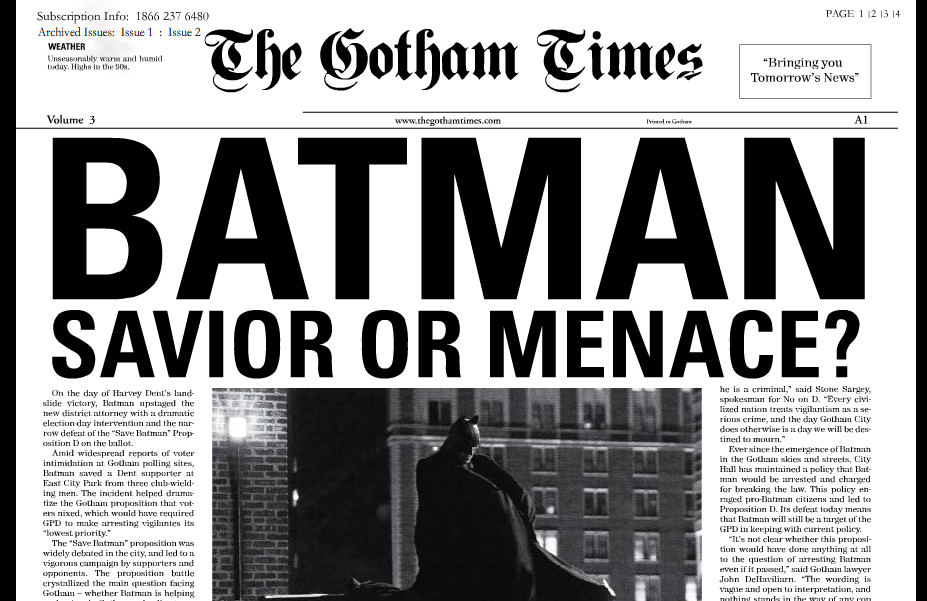
This is exactly why I have become a fan of Jason Todd’s Red Hood in The New 52.
He’s calmed down somewhat and is starting to grow out of his grudge against the Batman and is now focusing more on taking out criminals.
Whereas Batman sends off the mass murdering psychos to jail, when they say “I’ll never stop” Red Hood says “I understand” then puts a bullet in his or her head…
Is Red Hood a villian for killing people, or is Batman for letting mass murderers live when he knows they can and will do it again?
Batman’s aleardy set himself apart from the law the moment he put on the cape and cowl.
The question that sticks out to me is this: Since he has already put himself in the position where he is the only one equipped to stop these monsters, is there not some point where he no longer has a right to refuse to take them out permenantly?
“In the end, perhaps the real statement should be that Gotham is the city Batman deserves. After all, he helped make it what it has become.”
I don’t agree with that statement above…Gotham MADE him what he was…his parents were murdered in front of him remember (kind of reminds me of Dexter story nowadays) Batman just has his own since of moralilty like Dexter. Basically to do something about the crimes he sees in the BEST way that he can live with. We all have levels we are not willing to cross to get the job done. I think if Batman looked at it like a solider would and saw that it was a “war” then he might deal out Justice differently.
But his mind isn’t wired to see it that way or to be judge,jury and executioner…it never has been… he’s not the Punisher or Red Hood or any other character like a Wolervine who don’t blink an eye at killing when they have to.
His Psychosis doesn’t run as deep as theirs…and to defend Batman you can say the same thing about Superman (mr goodie two shoes), How many people have died just for no other reason than that Superman exists. EVERY Heroic character is neutered to the point of not being able to defend everyone and inviting mayhem…Sherlock Holmes has
James Moriarty.
The latest Amazing Spiderman arc in the comics is basically “NobodyDies while I’m around” They wrote this because they know it’s just not sustainable and it’s gonna make a good story when everything blows up in Spiderman’s face.
So don’t pick on just Batman…pick on every hero out there.
I know this, without him , Gotham City wouldn’t exist at all. Every citizen would be dead or have moved away.
It’s difficult to talk about Batman’s complicity in the deaths of Gothamites being a result of his refusal to kill criminals in any sort of real world context. It’s not Batman’s responsibility to execute murderers, it’s the state’s, if whatever state Gotham is in has the death penalty. In the real world, there’s no way someone who has racked up the body count the Joker has, legally insane or not, would be returned, over and over, to the same mental asylum, only to escape yet again and murder a few dozen more people. And considering that many of his crimes would fall under the heading of terrorism, certainly federal law could be brought to bear as well.
The point here is that it’s not Batman’s morality, or any other philosophical matter, that keeps the Joker and his ilk alive. His survival is market driven. Comics’ high profile supervillains are simply too profitable for the publishers and studios to let moulder in the grave. Also, if a character doesn’t put in semi-regular appearances, the trademark might lapse, and there go the merchandising opportunities (this same factor keeps heroes, like Supergirl, from staying dead for too long).
Regarding the matter of Batman’s presence attracting over the top villains to Gotham, this is an inversion of the hero-villain dynamic first established in the early days of pop culture heroic narratives. Jules Feiffer points this out in the first chapter of “The Great Comic Book Heroes.” In the early pulps, newspaper adventure strips, and comic books, supervillains predated superheroes. According to Feiffer, the villains had such an advantage that it was no longer possible to believe that ordinary mortals could defeat them, and so the rise of superheroes was not so much a stroke of originality, but rather an inevitability.
@wizard Clip
You make an excellent point and a better argument than I would likely have thought up against my earlier question.
However, in universe I still think there exists the philosphical argument that Batman does bear at least some responsibility for the actions of supervillians he has allowed to live.
I believe he would not bear any culpability for saving a villian, no matter how dispicable once. But to do so time and again when he knows they will likely just escape and go on another killing spree?
More importantly, Batman/Bruce Wayne would not be responsible for all of those deaths had he not intentionally placed himself in a position where he and he alone is equipped with the technology and resources to track them down and stop his rouges gallery.
Wayne has a private fortune in the billions of dollars (the one time I know it was listed was in the 60’s at $6 billion–given the rate of inflation he’s probably worth more than $2o billion today) He could easily use those private funds to replace the Gotham Police Department (with the permission of the public via referendum) with a better trained and better equiped force.
Give them access to the latest in Waynetech and have hundreds of the best law enforcement officers force on the planet taking out criminals of all kinds. *SpoilersAlfred actually brought that up in the Dark Knight Rises end spoilers*
Hell, if he really was willing to stop violent crime, he would let Martian Manhunter in Gotham and give him a month or two to psychically track down the most dangerous criminals and capture them.
Instead, he has actually forbidden any non-batfamily hero from interfereing at times, and with the exception of a few government defense contracts, he keeps all the best toys for himself.
The old Batman did kill criminals, with guns even.
I think our culture is getting the Batman it deserves.
@wcarter:
Yes, when you look at the comics’ internal logic, it’s definitely more complicated than “we have to keep these villains alive so that we don’t miss out on merchandising opportunities.” At the same time, since DC is owned by Warner Bros., those market forces limit what Batman is allowed to do, much more so than if he were a creator owned character published by Dark Horse or IDW, etc. In other words, whether or not Batman should kill criminals is not purely the subject of an untainted philosophical debate amongst the writiers and editors.
All that aside, whatever the ultimate motivations, it was very important to me as a kid in the 70s that Batman did not kill his adversaries. Of course, in those days, virtually no superhero did ( The Spectre was an exception), and that was important to me too, but Batman was special because he wasn’t superhuman. His restraint was also notable given his origins and, as you note, the especially bloodthirsty character of many of his villains. That Batman did not cross that line and claim the authority to dispense the ultimate sanction had a huge impact on my own outlook and worldview (yes, I’m that much of a geek).
You mentioned the Red Hood. Did you read the storyline from a few years ago concerning the revival of Jason Todd and his adoption of the Red Hood persona? His vendetta against Batman is motivated by this very issue. He can’t believe that Batman didn’t love him enough to kill the Joker to avenge Jason’s death. Batman’s explanation for why he didn’t do so may or may not be satisfactory, but it adds yet another philosophical wrinkle to the debate.
@tudzaxi:
Yes, Old Batman was more lethal, but I believe this is generally overemphasized whenever the subject comes up. I think it’s more true that he was –ahem–somewhat careless when dishing out the ass-kickings. Punch one thug–whoops, he fell into that pesky vat of acid. Fling another over your shoulder–whoops, who knew the edge of the skyscraper was so close?
But really, I can think of only two cases from the golden age when he set out to intentionally kill villains (there may be more that I’m missing). One is the Monk, who was a vampire, so maybe we can give Batman a pass on that one. The second case involves the giant, mutated thugs created by Professor Strange, and in this case Batman even expresses remorse at the necessity of “taking human life.” In fact, according to former Batman editor Carmine Infantino, this was the story that turned the tide, and there after the editors decreed that Batman would not use lethal violence. This was, I believe, 1940, a mere year after Batman’s creation, so that pulp-inspired bloodiness was reined in pretty quickly.
While it’s true that the post-Batman Gotham has created more than its fair share of monsters, look what else it has created.
Jim Gordon
Nightwing
Oracle
Huntress
Spoiler
A Catwoman who can occasionally work with the heroes
The second Question
Three different Batgirls
A seemingly endless supply of Robins
Terry McGinness
Hope.
Yes, the criminals in Gotham are escalating, but they’re not the only ones. I think Gotham has more per-capita heroes than anywhere else in the DCU.
The city needs Adam West.
That way, crimes are still prevented and the only supervillains that come out of it are completely incapable of killing people or executing plans that aren’t completely ridiculous.
As an added bonus, the city will be forever safe from sharks.
If you were talking about the comics only, you may have a point. However, by bringing in the movies, there’s a problem with your theory – Batman Begins.
Ra’s Al Ghul (and the League of Shadows)’s plan is to destroy Gotham. Without Batman, the city would be destroyed, and it’s also their attempt that forces Batman to stop being a myth and actually be visible.
This then leads to escalation, and your theory does somewhat explain The Joker. It may be that this would have happened anyway, just like it did in the comics, but we can only deal with what we see on the screen.
I think Superman’s assessment of Batman, in Kingdom Come, said it best: He stated that, when everything is stripped away from Bruce Wayne, what’s left is a man who doesn’t want to see anyone die. That is Batman’s job: To save the innocents. He’s a policeman, not a judge, and that’s the way he needs to be to preserve his own sanity.
If anything, we should question Gotham’s judicial system, and whether it can afford to allow mass murders clinging to insanity pleas to live, or if they need to be sent to an Antarctic version of Gitmo or just given over to Lobo to drop them into the Sun for fun and profit.
I’d imagine Batman himself would be most frustrated by the fact that he does the hard work of stopping the crazies, but the system doesn’t follow up on his deeds by manning up and dealing with the crazies once and for all. How many times have characters in Batman’s comics, or for that matter comics readers, found themselves saying, “Ahh, they’ll just be sent to Arkham, and they’ll be back on the streets in a few months”?
It’s Gotham that doesn’t have the stones to deal with its lawless element as they should, even with the Batman providing a service they themselves don’t seem to be willing to provide. It’s Gotham that doesn’t deserve Batman… Gotham City isn’t good for itself.
And SJordan just completely invalidated my argument with a simple observation. Oh well.
what everybosy seem to forget is Batman’s ability to predict everyone’s action. This cannot be possible unless you are omniscient or if you cause everything. Batman simply sets up criminals to do a “job” just so that he can catch them and be the hero. Also please note that most criminals were created as super-villains by Batman himself. The author says that with Batman gone the super-villains will not change. I disagree. When the Jocker thought he killed Batman he gave up even on living.